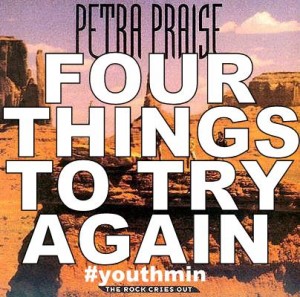 I remember the good ol’ days of youth group… walking into the fellowship hall, already smelling of sweat and grass stain from a good pre-youth-group game of Ultimate Frisbee. A mix tape full of Petra and Hokus Pick tunes was cranking on the boom box. There was a great snack, made up of a variety of leftovers from the senior citizens’ group that met earlier in the day. Transparencies with the night’s songs waited at the overhead projector.
I remember the good ol’ days of youth group… walking into the fellowship hall, already smelling of sweat and grass stain from a good pre-youth-group game of Ultimate Frisbee. A mix tape full of Petra and Hokus Pick tunes was cranking on the boom box. There was a great snack, made up of a variety of leftovers from the senior citizens’ group that met earlier in the day. Transparencies with the night’s songs waited at the overhead projector.
It was a simpler time. Youth Group was a game, a few familiar songs, five minutes of teaching and 12 minutes of “well, what about…” questions. We laughed, we prayed, and then we hung out in the parking lot until mom or dad came to pick us up.
And thinking about it, why wouldn’t we consider bringing back the good old days?
1. Play awesome games.
What was it about snow football, slap scatter, and Frisbee Fran and Frank that were so great? They were simple, but fun. Everybody played, everybody had a shot at doing well, and if things weren’t going well, there was always shouting, “Next point wins!” to bring it to a close.
Games don’t have to be complicated. In fact, I recommend games that you can explain in one sentence or less. If it takes longer, you’ll lose attention and energy. Complicated rules for games tend to alienate the least athletic in your group—people who aren’t as familiar with these types of activities—and actually reduce the fun. (I’ll post the simple rules to some of my favorite games over the next few weeks.)
2. Sing familiar songs.
Praise and worship should be an essential part of our youth ministry gatherings. But, again, we should keep it simple. Be sure to set your students up with a reason to praise God, besides the fact that they’re at church. Choose songs that many of them will know, it helps to create critical mass if everyone isn’t learning every song for the first time while you sing it.
When you do introduce new songs, do it slowly. Play the radio version, if there is one, as kids arrive for several weeks. This will help them become familiar with the tune and the chorus. In addition, if there are words or phrases in the song that might not be clear to students, teach them what they mean (every time you sing it) or just rewrite those lyrics with words that make more sense.
A friend of mine recently described a time when at a 4-day retreat he played all the worship songs from an ipod, and only during the final worship session led the songs with live music. “That last time,” he said, “Was the most powerful worship experience I’ve ever had with students.”
3. Keep your teaching tight and encourage questions.
In many contexts, we have made our youth ministry programs look more like our big church services—with a guy on the stage teaching who then disappears after the message and leaves it up to the small group leaders to field the students’ most pressing questions.
Instead, consider a more relational approach to your teaching, allowing students to interact, ask dumb questions, and get real answers. Often, this will help you discover the real things your students need to learn about… things that might never make it into a sermon series planning calendar.
4. Encourage natural relationships.
In a previous post, I discussed the value of Natural Relational Connectedness in ministry. Allow your students to connect in the groups that make the most sense to them. Don’t always separate them from their friends and force them into unnatural small groups. By allowing them to connect naturally with the people they are most drawn to, their connection with your ministry will be enhance.
You know this is working when, immediately after you dismiss them, they find ways to continue to be together: they stay in the youth room to talk, head out to the parking lot to shoot baskets, or pick up the game you just led where you left off when you ran out of time.
Youth pastors, what’s something you did as a student that you’re bringing back to your youth group now?